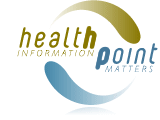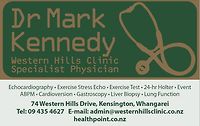Dr Mark Kennedy
Western Hills Clinic
74 Western Hills Drive
Kensington
Whangarei 0112

Dr Mark Kennedy - Private Internal Medicine Specialist

Postal Address
Contact Details
Phone (09) 435 4627, or if URGENT, Linda Clinical Nurse Specialist 021 689 447 outside of clinic hours
Mobile Emergency Phone (021) 702 395
Email admin@westernhillsclinic.co.nz
Healthlink EDI: west74hc
For any urgent Echocardiogram, Exercise Stress Echocardiogram or Exercise Tolerance Test, contact Clinical Nurse Specialist (Linda) on (09) 435 4627 on Tuesday and Thursday (or 021 689 447 outside those days). If she is unavailable and it is URGENT, call Mark Kennedy on (021) 702 395. We can undertake Transthoracic Echocardiograms most weekdays.
Cardiac Arrhythmias
Patient information:
Your heart rate is controlled by an electrical system within the heart muscle. This system drives your heart to go faster when you exert yourself, and slower when you rest.
A number of conditions can affect the heart rate or rhythm. Heart rate simply refers to how fast your heart is beating. Heart rhythm refers to the electrical source that is driving the heart rate, and whether or not it is regular or irregular. As some types of arrhythmias can cause you to faint without warning, your doctor may restrict your driving until the condition is controlled.
Some common terms
• Sinus rhythm is the normal rhythm
• Dysrhythmia means abnormal rhythm
• Fibrillation means irregular rhythm or quivering of one part of the heart
• Bradycardia means slow heart rate (less than 60/minute)
• Tachycardia means fast heart rate (more than 100/minute)
• Paroxysmal means the arrhythmia is present only intermittently
Tachycardia
The most common form of this is atrial fibrillation. This is where your heart rhythm is irregular and often too fast. Symptoms include fatigue, palpitations (where you are aware of your heart racing or pounding), dizziness and breathlessness. Other tachycardias include supraventricular tachycardia (SVT) or ventricular tachycardia (VT). These have similar symptoms as atrial fibrillation but can also cause you to lose consciousness (blackout).
Bradycardia
A common form of this is related to electrical heart block. This occurs because messages from the electrical generator of the heart don't get through efficiently to the rest of the heart and hence it beats very slowly or can pause. Symptoms of the heart going too slowly include feeling tired, breathless or blacking out.
Treatment
Most treatments for tachycardias consist of medication to prevent the abnormal rhythm or make it slower, if and when it occurs. Atrial fibrillation can increase your risk of stroke, so blood-thinning medication is often used as well. If you have bradycardia you may be referred to an Auckland cardiologist for a permanent pacemaker. This is a small operation where a battery powered device is placed under the skin with wires that lead to your heart and provide it with electrical stimulation to prevent the heart from beating too slowly. You can't feel it doing this, but you will be aware of a small flat lump under your skin just below your collar bone.
https://www.healthpoint.co.nz/private/internal-medicine/dr-mark-kennedy-private-internal-medicine/